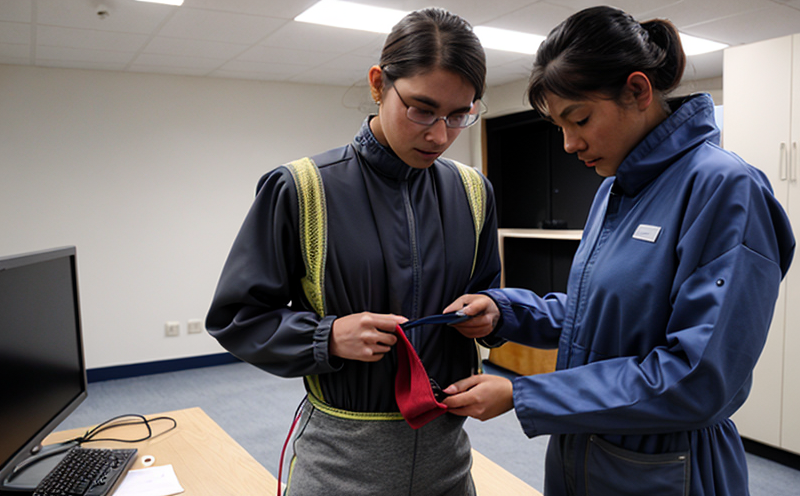ASTM F1862 Resistance of medical masks to penetration by synthetic blood
The ASTM F1862 standard is a critical test that evaluates the resistance of medical masks to penetration by synthetic blood. This test is essential for ensuring the integrity and effectiveness of personal protective equipment (PPE) used in healthcare settings, where breaches could lead to potential contamination risks.
Medical masks are designed to provide protection against various contaminants, including infectious agents such as bacteria, viruses, and other microorganisms. The ASTM F1862 test specifically focuses on the mask's ability to prevent synthetic blood from penetrating through its layers. Synthetic blood is used in this test because it mimics real human blood in terms of viscosity and particle size, making it an effective surrogate for evaluating penetration resistance.
The standard requires that medical masks be tested under controlled conditions to simulate a worst-case scenario where the mask might come into contact with synthetic blood during use. The testing apparatus typically consists of a specialized fixture designed to apply pressure or flow rates similar to those encountered in real-world situations. This ensures that the test accurately reflects how the mask will perform in actual use.
The specimen preparation for this test involves careful selection and handling of the medical masks. The masks must be free from any defects, tears, or other imperfections that could compromise their performance during testing. After preparation, the specimens are placed into the testing apparatus according to the specified protocol outlined in ASTM F1862.
The acceptance criteria for this test are stringent and are designed to ensure high levels of safety and effectiveness. A mask passes the ASTM F1862 test if it successfully prevents synthetic blood from penetrating its layers under the specified conditions. This includes both static pressure tests and dynamic flow rate tests, which simulate different types of potential exposure scenarios.
The results of this test are crucial for quality managers and compliance officers in ensuring that medical masks meet regulatory requirements and provide adequate protection to healthcare workers and patients. For R&D engineers, understanding the ASTM F1862 test can help in optimizing mask design and material selection, while procurement teams rely on these tests to verify that purchased products meet the necessary standards.
The ASTM F1862 test is just one of many rigorous evaluations conducted by laboratories to ensure the quality and safety of medical equipment. By adhering to this standard, manufacturers can demonstrate their commitment to producing reliable and effective PPE, thereby fostering trust among healthcare providers and regulatory bodies.
Why It Matters
The ASTM F1862 test is vital for several reasons. Firstly, it ensures that medical masks meet the highest standards of protection against synthetic blood penetration, which is a key factor in preventing cross-contamination in healthcare settings. Secondly, this test helps to maintain patient safety by validating that PPE effectively blocks potentially harmful substances from reaching the wearer or others.
From an operational standpoint, compliance with ASTM F1862 standards can reduce risks associated with improper equipment use and improve overall hygiene practices within facilities. Additionally, successful passage of this test can enhance a company's reputation as a leader in medical safety products, attracting more customers and partnerships.
The results of the ASTM F1862 test are also important for regulatory bodies like the FDA (U.S. Food and Drug Administration) or equivalent authorities worldwide. These organizations use these tests to assess whether imported or domestically produced medical masks comply with international standards.
Why Choose This Test
Selecting ASTM F1862 for testing your medical masks offers several advantages over other methods. It provides a standardized approach that ensures consistency across different laboratories and batches of products, reducing variability in results. The test is recognized globally, which simplifies compliance efforts for companies operating internationally.
Moreover, the ASTM F1862 test allows for comprehensive evaluation of mask performance under various conditions, providing valuable insights into potential weaknesses or strengths. This information can be used to refine manufacturing processes and improve product design continuously.
A significant advantage of choosing this test is its ability to identify issues early in the production cycle, allowing manufacturers to address problems before they become costly defects later on. By incorporating ASTM F1862 testing into their quality control procedures, companies demonstrate a proactive approach to maintaining high-quality standards and safeguarding public health.
The rigorous nature of ASTM F1862 also builds confidence among end-users by assuring them that the masks they use meet stringent performance criteria. This trust can translate into better patient outcomes and improved worker safety in healthcare environments.
Environmental and Sustainability Contributions
- The ASTM F1862 test helps reduce waste associated with poorly performing medical masks by ensuring only high-quality products reach the market.
- By enhancing mask performance, this test supports more effective infection control measures, which can lead to reduced environmental impact from unnecessary treatments or procedures.
- The standard encourages continuous improvement in mask design and materials selection, potentially leading to innovations that reduce overall resource consumption during production.
Incorporating ASTM F1862 into quality assurance protocols contributes positively to sustainable practices by promoting the use of safer and more effective medical equipment. This not only benefits immediate health outcomes but also has broader implications for environmental stewardship.





